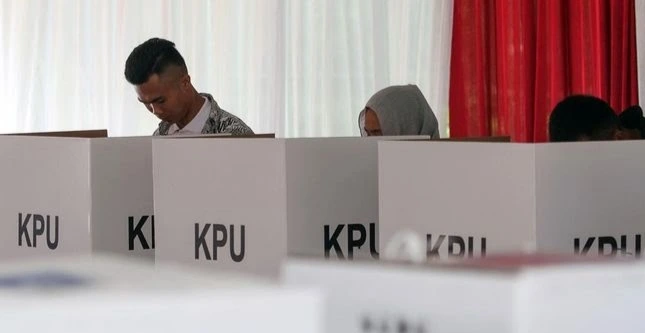Low Voter Turnout: Why Are Indonesians Losing Interest? Let’s Get Real About Democracy
JAKARTA, turkeconom.com – Low Voter Turnout: is a pressing issue in many democracies around the world, and Indonesia is no exception. Despite being the world’s third-largest democracy, Indonesia has witnessed a significant decline in voter participation over recent elections. This article explores the factors contributing to low voter turnout in Indonesia, examining the implications for democracy and potential solutions to engage citizens more effectively.
Understanding Voter Turnout in Indonesia
 Historical Context
Historical Context
Indonesia has a rich political history, transitioning from an authoritarian regime to a democratic system in the late 1990s. The initial post-reformasi elections saw a surge in voter enthusiasm, with high turnout rates reflecting a newfound commitment to democratic participation. However, this enthusiasm has waned over the years, leading to concerns about the health of Indonesia’s democracy.
Recent Trends
In the 2019 presidential election, voter turnout was approximately 81%, a decline from earlier elections. The 2020 regional elections saw even lower participation, with some areas reporting turnout rates below 60%. This downward trend raises critical questions about the factors influencing citizen engagement in the democratic process.
Factors Contributing to Low Voter Turnout
1. Disillusionment with Politics
Many Indonesians express disillusionment with the political system, feeling that their votes do not lead to meaningful change. Corruption scandals, ineffective governance, and unfulfilled campaign promises have eroded trust in political leaders. This disillusionment often translates into apathy, as citizens question the value of participating in elections.
2. Lack of Awareness and Education
A significant barrier to voter participation is the lack of political education and awareness among the population. Many citizens, especially younger voters, may not fully understand the electoral process, the importance of their vote, or the implications of their choices. Without adequate education on these topics, individuals may feel disconnected from the political landscape.
3. Accessibility Issues
Geographical and logistical challenges can hinder voter participation, particularly in remote and rural areas. Many Indonesians face difficulties accessing polling stations due to inadequate transportation, long distances, or poor infrastructure. Additionally, the complexity of voter registration processes can discourage potential voters from participating.
4. Influence of Social Media
While social media has the potential to engage and inform citizens, it can also contribute to low voter turnout through misinformation and polarization. The spread of fake news and negative campaigning can create confusion and distrust, leading individuals to disengage from the electoral process altogether.
5. Economic Factors
Economic instability and pressing daily concerns can overshadow the importance of voting for many Indonesians. When individuals struggle to meet basic needs, political participation may take a backseat to immediate survival. This economic pressure can diminish the perceived relevance of elections in their lives.
The Implications of Low Voter Turnout
Threats to Democracy
Low voter turnout poses significant threats to the democratic process in Indonesia. When fewer citizens participate in elections, the legitimacy of elected officials can be called into question. A disengaged electorate may lead to the rise of populist leaders who exploit discontent rather than addressing the root causes of political apathy.
Underrepresentation of Voices
Low participation rates can result in the underrepresentation of certain demographics, particularly marginalized groups. When specific voices are excluded from the electoral process, policies may fail to address the needs and concerns of the broader population, perpetuating inequality and social injustice.
Strategies to Increase Voter Turnout
1. Enhancing Political Education
To combat low voter turnout, it is crucial to invest in political education initiatives that inform citizens about the electoral process, the importance of their vote, and how to engage effectively in democracy. Schools, community organizations, and media campaigns can play a vital role in raising awareness and fostering a culture of civic engagement.
2. Simplifying the Voting Process
Streamlining voter registration and making the voting process more accessible can encourage higher participation rates. Implementing online registration, providing clear information about polling locations, and ensuring adequate transportation options can help remove barriers to voting.
3. Leveraging Technology
Utilizing technology and social media responsibly can enhance voter engagement. Campaigns that promote accurate information, encourage discussions about important issues, and mobilize citizens to vote can harness the power of digital platforms to invigorate the democratic process.
4. Building Trust in Political Institutions
Restoring trust in political institutions is essential for increasing voter turnout. Transparency, accountability, and genuine efforts to combat corruption can help rebuild faith in the political system. When citizens believe their votes matter, they are more likely to participate.
5. Addressing Economic Concerns
Addressing the economic challenges faced by citizens can create an environment where political participation is viewed as relevant and impactful. Policies that promote economic stability, job creation, and social welfare can alleviate some of the pressures that deter individuals from voting.
Conclusion
Low voter turnout in Indonesia is a multifaceted issue that requires a comprehensive approach to address. By understanding the underlying causes of disengagement and implementing targeted strategies, stakeholders can work towards revitalizing the democratic process. Engaging citizens, enhancing political education, and restoring trust in political institutions are crucial steps in ensuring that every Indonesian feels empowered to participate in shaping their future. A thriving democracy relies on the active involvement of its citizens, and it is essential to rekindle their interest in the electoral process for the benefit of the nation as a whole.
Sharpen Your Skills: Delve into Our Expertise on Politic
Check Out Our Latest Piece on Media and Politics!











